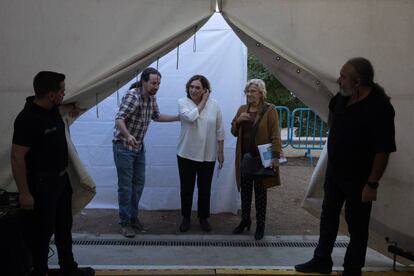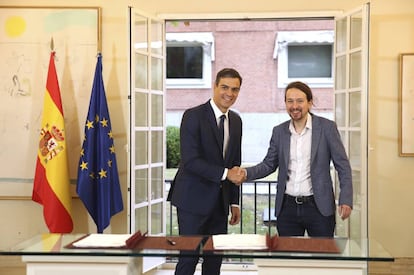Spain’s Podemos: from street protests to governing deals in four years
After a much-publicized budget deal, Pablo Iglesias sets his sights on governing with the Socialists in 2020

In the space of under five years, the anti-austerity Podemos party has gone from wanting “to take heaven by assault” during the Indignados protests in Madrid’s Puerta del Sol to solemnly signing a budget pact with the Socialist Party (PSOE) at the Moncloa Palace on October 11.
And in just four months, Podemos leader Pablo Iglesias has gone from predicting “an ordeal” for Spain’s Prime Minister Pedro Sánchez after the latter won a no-confidence vote and declared he would govern alone with just 84 deputies in Congress, to putting his own name to an agreement to try to avoid early elections.
We have had to learn new ways of doing politics in a hostile environment, and to learn fast
Iñigo Errejón, Podemos
Emerging from the signing, the Podemos leader alluded to the then-unknown youths with ties to the Indignados movement who unexpectedly secured five seats at the 2014 European elections. In January of that year, Iglesias, a political scientist, had presented his new party at the Teatro del Barrio in Lavapiés, Madrid, with a similar declaration: “They said in the city squares that yes, we can, and we want to say today that indeed we can!”
According to a party leader, “we have had to learn new ways of doing politics in a hostile environment, and to learn fast. There have been any number of obstacles to entering the institutions.” This is what the party’s secretary for policy and strategy, Iñigo Errejón, has referred to as “years of maturing and a few scars.”
Almost five years on, after successfully unseating Mariano Rajoy and his center-right Popular Party (PP) from power with a no-confidence vote, Podemos is preparing to govern Spain in coalition with the PSOE; if possible in 2020 – no one in the Iglesias camp is in favor of a snap election.

“Podemos has arrived at agreements with the PSOE on a municipal and regional level. The real anomaly is the lack of any deals at state level,” says Pablo Simón, a professor of political science at Carlos III University in Madrid. After highlighting the influence that Podemos has begun exerting “in a very accelerated fashion,” Simón links its evolution to other left-wing parties in Europe, such as the Bloco da Esquerda in Portugal or the Green Party in Germany. “They moved from a position of confrontation with the establishment to a position of cooperation that places them in coalition governments in some cases, as will surely be the next step here,” he says.
Meanwhile, the Podemos spokesman concedes, “we have stumbled on many occasions. But we have been able to overcome the obstacles. Podemos is a flexible party.”
The next phase in their bid for power includes the 2019 regional and local elections in which they hope to form governing coalitions. This will pave the way for what could be the first coalition government in Spain that would see a Podemos-PSOE power share at the national level. “We have broader shoulders now than we once did,” says Iglesias, using a Spanish phrase to imply they are now less rigid. “But we still have the same enthusiasm.”
Anticapitalistas warn of the risk of subordination
The Anticapitalista movement within Podemos that hangs furthest to the left are the most suspicious of the deals between Podemos and the PSOE. While recognizing the benefits of the budget pact, they insist that it does not go far enough.
They argue that by not going further, Podemos runs the risk of becoming subordinate to the PSOE, reducing candidates’ prospects to a mere corner in the government. “What should be nothing more than a beginning can turn into the end of a cycle of progress,” they said in a statement.
“It is possible to go much further […]. The gains are not as ambitious as we want. It should be noted that the initial ambition with which the negotiations were begun was small,” they added.
The Anticapitalistas believe that the PSOE will be very reluctant to burst the rental price bubble. Prices have risen in the last five years by 47% in Barcelona and by 38% in Madrid, two cities that are governed by Podemos and their allies.
The party has learned to concede and to negotiate without being demanding. The handshake between Sánchez and Iglesias last Thursday at La Moncloa, the prime ministerial palace, was proof that the style with which the Podemos leader once demanded a vice-presidency in a three-party coalition with the United Left (IU) and PSOE at the start of 2016, is a thing of the past. Back then, the Podemos proposal, which included control over several ministries, caught Sánchez off guard when he was in a meeting with Felipe VI in a bid to form a government. “Voters will not understand why the leader of Podemos and I cannot reach an understanding,” said Sánchez at the time.
The mutual mistrust that characterized the relationship between both leaders lasted until the no-confidence motion in late May. “We have gone from the logic of old versus new politics to bloc logic,” says Simón. “And there’s a price to pay with blocs. Podemos will try to nudge the PSOE further to the left to take progressive measures.”
The first evidence of this is the budget deal. “This is what we are here for, to be useful and to improve people’s lives. It can be done and we are going for more!” declared Errejón, referring to a pledge to raise the minimum salary from €735 to €900, measures to steady rental prices, and non-transferable paternity leave.
While Iglesias has expressed moderate satisfaction with the agreement, the most left-leaning wing of Podemos, the Anticapitalistas, are also happy. Its leader, Teresa Rodríguez, the Podemos-IU candidate in the upcoming Andalusian elections, is also celebrating. “When the PSOE sits down to negotiate with Podemos, the minimum salary rises by 23%; when the PSOE sits down with Ciudadanos, there are tax breaks for the wealthy.”
English version by Heather Galloway.
Tu suscripción se está usando en otro dispositivo
¿Quieres añadir otro usuario a tu suscripción?
Si continúas leyendo en este dispositivo, no se podrá leer en el otro.
FlechaTu suscripción se está usando en otro dispositivo y solo puedes acceder a EL PAÍS desde un dispositivo a la vez.
Si quieres compartir tu cuenta, cambia tu suscripción a la modalidad Premium, así podrás añadir otro usuario. Cada uno accederá con su propia cuenta de email, lo que os permitirá personalizar vuestra experiencia en EL PAÍS.
¿Tienes una suscripción de empresa? Accede aquí para contratar más cuentas.
En el caso de no saber quién está usando tu cuenta, te recomendamos cambiar tu contraseña aquí.
Si decides continuar compartiendo tu cuenta, este mensaje se mostrará en tu dispositivo y en el de la otra persona que está usando tu cuenta de forma indefinida, afectando a tu experiencia de lectura. Puedes consultar aquí los términos y condiciones de la suscripción digital.








































